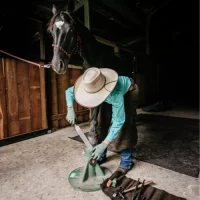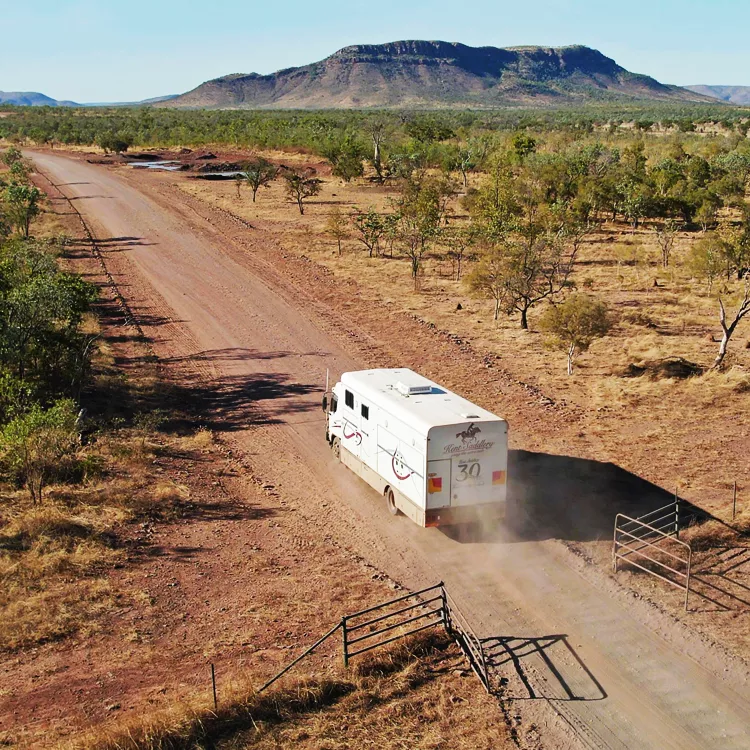Bulka Station, The Kimberley, WA – Jim and Joy Motter
“Its not hard if you want something”
The headline of ‘The West Australian’ read ‘Bush Wedding of the Year’, and featured photographs of the young couple married at Fitzroy Crossing, West Kimberley on 3rd of October 1970. “Bloody embarrassing, I thought” says Jim.
Jim Motter lived 30 miles out of Meekatharra as a kid, where his parents operated a gold mine. His Dad had come from Italy and … “got a bit of gold, but like all old prospectors, the more you got, the more you gotta chase, so you end up losing what you got!” Jim was always “horse mad”, and was a 12 year old runaway from school. Apart from 3 months in Perth where he volunteered to serve in Vietnam…“out of 32 of us, they took 2,” his life has been around horses and cattle. He walked out of the recruitment office, straight across the road to Emanuel Bros Office and got a job at Go Go Station, near Fitzroy Crossing. It was 1967, and for the next few years Jim moved to and from Go Go to Cherrabun and Fossil Downs Stations, gaining skills and experience. In 1974 he was appointed manager of Cherrabun.
Joy’s family lived in Warrnambool, Victoria, and following nursing training, she and a friend took a boat trip from Perth to Darwin stopping off at Derby. She decided “this is where I want to go!” In 1968 her appreciation for that part of the country resulted in the long journey to take up an offer of nursing in Fitzroy Crossing with the Australian Inland Mission. She remembers saying “That’ll do!” That was where she met Jim, they were married, and their two boys Clinton and John were both born at the Derby hospital. At Cherrabun, the boys spent their primary years doing school of the air, riding horses and motor bikes and an old bull buggy up and down the airstrip. Secondary education at boarding school in Perth was a bit of a shock for those bush kids! At Cherrabun, Joy became involved with Aboriginal welfare, and worked part time for the Health Department to oversee health projects. She also ran the store and meathouse, and being independent, confident, and used to making her own decisions, she experienced some difficulty adjusting to the protocol of the station! She maintains that overall she adjusted well to the extreme change of lifestyle in the far North. “I was always able to entertain myself with reading, knitting or sewing and was quite happy with my own company.”
All his working life Jim wanted to own his own block, and worked towards achieving the goal. In 1989,WA livestock Holdings, a government body , initiated reorganisation and subdivision of some of the stations around Fitzroy Crossing. Bulka Station came up for bare auction, and the Motters were successful bidders.
The spectacular bit of country was theirs. There was one yard, two windmills, and one paddock. Jim recalls “I got here with the Missus, two kids and a plant of horses.” A muster of Bulka Station produced three cleanskin cull shorthorn heifers and two mickeys. In response to the comment that it must have been hard, Jim questions, “Hard? Its not hard if you want something. It meant no money, no pub, and it was hard because it meant the family was split when Joy went back nursing and had to live in town. But, not us, we didn’t do it hard; it was the first people into the Kimberley… the ones who opened it up…they had it hard! We were the follow-oners!”
For the first couple of years Jim did contract mustering and day rate work, and for another 2 years he managed nearby Christmas Creek Station – to fund improvements and cattle purchases for Bulka. Joy returned to work for Community Health in Fitzroy Crossing, and “put bread on the table” for the next 15 years as they steadily established Bulka as a viable cattle station. Joy retired from nursing in 2004, and they shifted from their “shed home” into a newly built homestead.
Over the past 40 years the couple have established a respected association within the Kimberley and have been honoured with life membership of the Fitzroy Crossing Rodeo Club. They’ve also seen some significant changes in that time. At Cherrabun during the 1970’s Jim remembers the 2 stock camps with 15 to 25 blokes in each camp. He recalls the sound of corroborree at night, and says it was a pleasure to work with the Aboriginal musterers – “they could work cattle, and they never got lost.” Other memories include the introduction of aeroplanes and choppers for mustering; the bullcatchers, and the huge ‘clean up’ of cattle during the BTEC era. They were the days before Brahman cattle dominated the market, and there were Shorthorn cattle studs at Fossil Downs, Go Go and Christmas Creek.
Jim also loved rodeo… “I rode everything!” However, after they married, Joy put the pressure on and Jim’s rodeo days were over. His days as a fan of everything to do with John Wayne are far from over, and framed posters and prints of the actor decorate the walls of the Motter home. “I’ve always been into cowboy movies, and John Wayne was the main one. I never saw him as a baddie. I believe if you can’t do a good turn, don’t do a bad one, and that’s the way he (John Wayne) goes.”
For her part, Joy can look back with satisfaction at the results and benefits of working with a group of people for Community Health in the area, particularly for indigenous people. 15 years of involvement resulted in a greater understanding and trust that has helped to bridge the gap between the two cultures. So, why and what is so special about Bulka? Allowing himself a trace of Italian emotion Jim responds “Its home” and Joy follows with “Its ours.” Jim continues, “You’re sorta part of it. You’ve got your blood sitting out there in that dirt… and sweat and that. You just love it, it’s a piece of you. You know, I’m not even thinking of retiring,” and glancing at Joy, “but she’s giving me a hard time – time will come when you need to get out. You know, I’d sooner die here, really.”
Joy reflects “You don’t realize how much you like being up here til you go somewhere else. In Perth, Oh…push all those houses back! and, Why do I have to queue up with 20 people? Where’s my space?!” Its’ back at Bulka where they appreciate the awesome scenery, and the lifestyle they’ve established over the years. The couple have come to a time when they are looking realistically to the future, and Joy is the one who expresses the fact that “That’s where the trouble starts you see, because who’ll look after us here in our old age; … you do need people around you.” They appreciate their good neighbours and friends Brian and Vera Fielder at Christmas Creek, and are grateful for modern communication conveniences of 2 way radios, Sat phones, faxes and emails.
Jim knows all this. “Our two sons are not interested in taking over Bulka. They have their dreams elsewhere … It’ll be the end of me when we have to sell it. Well… put it this way; it probably won’t be the end of me, but a hell of a lot of me will be left here.”















